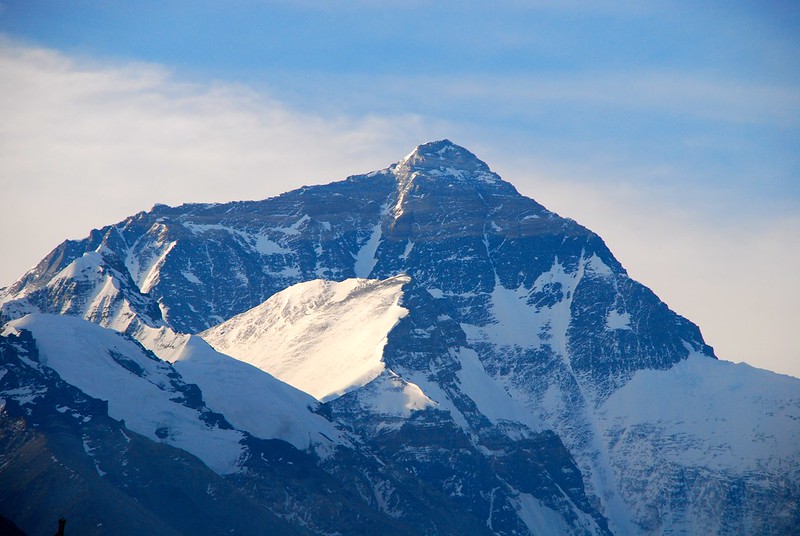Covid-19 Strikes Mount Everest Base Camp
May 20, 2021
The spread of the coronavirus in India has begun to extend to surrounding regions such as Nepal and Mount Everest, also known as the “roof of the world.”
Despite Mount Everest’s innately extreme and isolated conditions, the virus has managed to infiltrate into one of the base camps for the climbers. The sudden emergence of confirmed cases and symptoms of Covid-19 is rousing fears of a serious outbreak among the base officials and mountaineers. According to the BBC, the base received reports of 17 confirmed cases of the climbers from hospitals located in Kathmandu, the capital of Nepal. In his interview with the BBC, Lukas Furtenbach, the team leader of the Furtenbach Adventures, provided a glimpse of the severity of the situation concealed behind the steep snowy hills of Mount Everest. “You can hear people coughing everywhere… But this is not just the regular cough that the mountaineers catch here. You can make it out that people are in pain and they have other symptoms like fever and body aches,” said Furtenbach.
The lack of testing supplies and facilities is bringing the situation to a level in which the spread of the coronavirus is no longer detectable nor controllable. Without the testing supplies, it is hard to distinguish the symptoms of COVID-19 from the similar symptoms caused by the extreme environment of Mount Everest. In his interview with the BBC, Erlend Ness, a Norwegian Climber, told the BBC that he initially assumed that he was suffering from common altitude sickness until he was tested and diagnosed with COVID-19. The main reason for the lack of necessary supplies and facilities is the Nepalese government’s indifference towards the prevention of the spread of the virus. Dr. Prakash Kharel, an Everest base camp clinic, stated that the Nepalese government turned down their request for the installation of testing facilities. “We had requested a testing facility but the government said they could not give the permission,” said Kharel. Because of this, Large tourist organizations and expedition teams were forced to prepare their own testing supplies. However, the rest were unable to obtain such supplies, and therefore are defenseless against the potential spread of the virus. The only precautionary measure taken by the Nepalese government was to make quarantine mandatory in Nepal before entering Mount Everest and the base camp.
These apparent signs of the camp being on the brink of a major outbreak seem to be far from enough to make the Nepalese government acknowledge the confirmed cases in Mount Everest. Prem Subedi, the under-secretary at the Ministry of Culture, Tourism, and Civil Aviation denied the existence of confirmed cases of COVID-19. “None of the Covid cases at Everest base camp have been reported so far to the Ministry of Tourism,” said Subedi. The BBC reports that the Nepalese government’s complacency regarding the spread of the virus in the base has raised concerns and suspicions that the government is intentionally downplaying the threat posed by the virus to maintain its source of income from tourists. According to the official data released by the Ministry of Culture, Tourism, and Civil Aviation, in April 2021, the Nepalese government was able to make a profit of $3.79 million from issuing Mount Everest entrance permits. Also, according to Nepalindata’s Tourism Status document, the total foreign exchange earnings from tourism in 2018 exceeded 67 billion Nepalese Rupee, which is approximately $573 million. Given that Nepal’s GDP was $29.17 billion in 2018, the profit of $573 million from tourism is a considerable amount of money. The loss of income from these climbers and tourists would be detrimental to both the local and national economies. The government is continuing to issue entry permits, despite the rising concerns of the base camp authorities and the international community. It issued 394 Everest climbing permits for the current climbing season, and it is anticipated that the government has no withdrawal plans so far.
The Nepalese government closed the base camp in the March of 2020 to prevent the spread of COVID-19, but has resumed issuing entry permits starting September. It is speculated that similar measures must be taken immediately to halt the spread of the virus. During his interview with the BBC, an army official at the Everest base camp expressed his concerns and regrets about the situation. “It is unfortunate that we have not been receiving the details of the confirmed cases and the identities of the climbers all this time… That would have helped us in contact tracing and containing the spread much earlier,” he said. As the base officials, climbers, and local authorities are struggling to prevent the further spread of the virus, it is necessary for the Nepalese government to actively cooperate with the experts and provide necessary testing and treatment facilities.


















































































































































